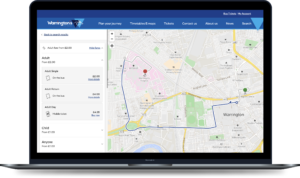
Today, Passenger is celebrating the launch of real-time bus fare information in its highly-rated white-label mobile app product, used by over 35 bus companies in the UK to sell tickets and provide travel information to riders planning their journeys.
For the first time, riders can find out how much their journey will cost before catching the bus. The new capability has been launched with Brighton and Hove Buses, Metrobus in Surrey, Warrington’s Own Buses, Reading Buses and Nottingham City Transport.
According to Transport Focus, the independent watchdog representing the interests of Britain’s rail, bus and tram passengers in England (outside of London), 33% of non-users — people who don’t know much about their local bus services — would like to know what the bus fare is going to be before boarding.
The app update from Passenger will address this by making information available to customers about tickets that can be purchased on the bus — from the driver — and as mobile tickets directly from a smartphone. Mobile tickets are already a popular way for riders to purchase tickets instantly for immediate travel.
The project is the first to use the NeTEx fares dataset, made available to the public as part of the national Bus Open Data Service (BODS). In development since 2018, the service by the Department for Transport (DfT) in England, was commissioned following the Bus Services Act in 2017. It was designed to stimulate innovation and grow passenger numbers by making local bus services easier to understand. Passenger has long supported open data standards in its software development. NeTEx, an EU (CEN) standard, was chosen as the baseline for Passenger’s new fares capability, following the DfT’s adoption of it for BODS in England.
The app update is the culmination of several Passenger software updates in recent months, including tools for operators to preview their fares data before publishing. These tools also support operators in becoming BODS compliant by bringing the data to life. Before this project, it took significant effort and cost for operators to see errors in their NeTEx datasets easily.
With many bus operators investing significant resource in publishing data via the BODS platform, the project is also a highly visible return on that investment.
Tom Quay, CEO of Passenger, comments, “The introduction of fare information to the Passenger app, and simultaneously to operator websites, is a huge milestone. When the Department of Transport announced it was adopting the NeTEx standard for its Bus Open Data Service, it was widely unknown in the UK. We’ve seen first-hand how much time and effort operators have invested in getting to this stage with BODS, so we’re delighted to be delivering a return on that — and one that has the potential to be game-changing for customers. As we break down the traditional barriers, trying the bus for the first time has never been easier”.
The app update is based on the currently available data. As the Bus Open Data Service evolves, more complex ticket products, such as time-based capped fares — calculated later and ‘capped’ based on how many journeys have been taken within a specific period of time — may be included.
The update is a free addition to operators within their existing Passenger app license. More operators are expected to launch with the fares capability in the coming months, extending the benefits to more riders. Passenger will be hosting a webinar on 22nd February 2024 to share further details about the project.